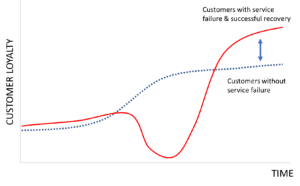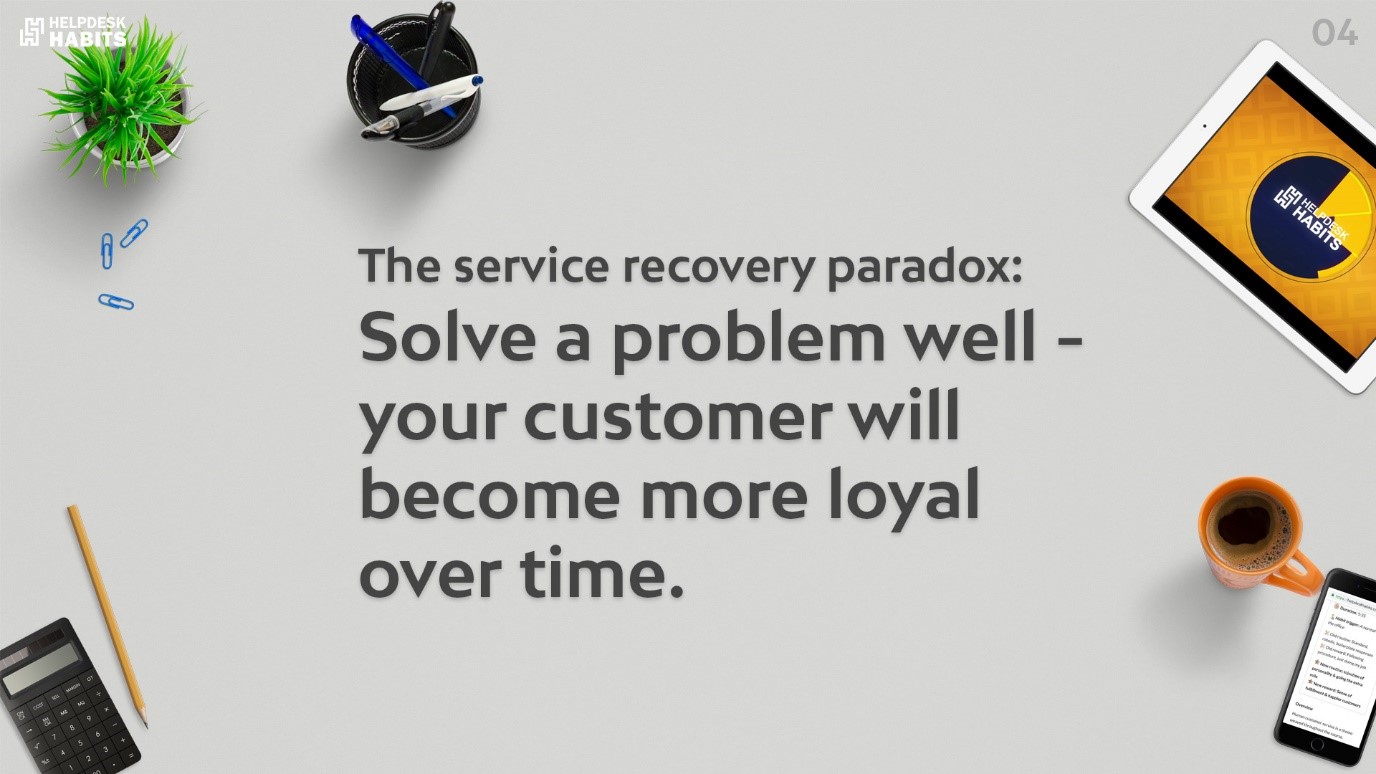 Mistakes happen all the time in business. No one is perfect and can foresee every eventuality. Servers are misconfigured, connections go down, and patches are missed.
Mistakes happen all the time in business. No one is perfect and can foresee every eventuality. Servers are misconfigured, connections go down, and patches are missed.
Whilst the immediate effect and impact of a service failure may not be great, outside of the heat of the moment, customers are generally understanding that things can go wrong.
How you react to and fix an issue is what really matters.
When the service recovery paradox was first pointed out to me graphically, it made a big impact on my thinking.
It states that, if you deal with a customer problem successfully, that customer is likely to become more loyal to you over time.
Let me rephrase that, for impact. If a customer suffers a service failure and you resolve that failure in a professional manner to their satisfaction, that customer will talk about you more, refer you more, and become more loyal to your company over time!
The graph below explains the concept graphically.
Why is this the case?
Think about the human psyche for a moment.
If an individual helps you out of a difficult situation (regardless of whether they’ve caused the problem in the first place) you will feel indebted to them. Your gratitude knows no bounds – it’s human nature at its finest.
Here’s an example of a conversation I overheard in a coffee shop recently.
“I ordered a new screwdriver set, which arrived this morning – the case was cracked – one of the screwdrivers was missing.
I spent two minutes on their chat, and a new one arrived the next day – I didn’t even have to send the broken one back!
I’m really impressed with (company name) – I’d definitely use them again.”
This is the service recovery paradox at work. A customer suffered a service failure, the story of that failure and resolution was told, a referral was made, and the customer was delighted. I suspect a great review was left in the relevant places too.
The opposite situation could have applied.
The company could have blamed the courier and a standoff would have ensued. Customer service would then tell you to call the courier. The courier says it was signed for. The consumer realises it’s a write off and it’s not worth spending the time on it. A customer is then lost and others will be told of the poor experience.
How to make the paradox work in your business
Help desk technicians have a massive part to play here. There will always be minor issues where something has gone wrong. If you as a business are the one to blame, then you must accept it graciously and go out of your way to fix the issue. The way you accept that blame is important. Don’t accept it with a “but”, don’t accept it with a “well, it’s not really our fault”. Choose your words wisely.
The next time your business causes or monitors a service failure, or creates customer distress, remember the paradox and put it to work.
My best advice is for the start of the resolution process. Just as you have that sinking feeling, think ahead one week. Visualise how the customer will be feeling if your business resolves the issue brilliantly.
Keep that feeling in mind at all times as you deal with the customer’s potential anger. Imagine how that customer’s mood will be once the problem has been resolved. Having this in your mind will help you to remain focused and calm.
Of course, they are not likely to forget the incident, but once the immediate impact and the emotion has subsided, they will likely be calmer and more understanding of the situation they were faced with.
Dealing with a service failure
 Make sure you have empathy with how a customer feels when a situation occurs. Remember this isn’t about a contract or a stat or a maintenance blip, this is about the impact on a relationship and how someone else is feeling.
Make sure you have empathy with how a customer feels when a situation occurs. Remember this isn’t about a contract or a stat or a maintenance blip, this is about the impact on a relationship and how someone else is feeling.
Appreciate the knock-on effect to their customers and your contact’s management chain. Understand they will be hurting, particularly if they were the one who brought you on board or recommended you originally.
Communicate well throughout the process. Ensure the customer gets frequent updates on the situation and how it’s being resolved. Always be transparent about the remediation process.
Once the problem has been resolved, don’t rush a response back to the customer. Take some time and space to gather information and speak with colleagues about the cause and how you dealt with the issues. Determine whether it was completely out of your control or not and what lessons can be learnt.
These types of situations can be freak occurrences that are impossible to plan for. Regardless, test whether or not you had done everything possible to mitigate the situation.
When you’re sure of the facts, write to the customer. Put together the best factual remedial report you can. Make it comprehensive, transparent, and honest. Apologise, but don’t grovel or go over the top – that doesn’t solve anything.
At the end of the report, address any contractual obligations with regards to compensation and be generous. If you contractually owe a customer $100 due to a two-hour outage, give them an additional two days of maintenance. Go the extra mile, without them asking you to.
The benefits of doing the right thing
In 2011, after my business caused a serious failure for a FTSE 100 customer, we were subsequently told we provided the best remedial report they had ever seen. They were doing ten times the amount of business with us within a couple of years and the incident was completely forgotten within a few weeks. The scarring effects remained with me for a few years, which was no bad thing – it keeps you sharp!
I’ve seen dozens of examples of the power of doing the ‘right thing’. Brilliantly resolved incidents in situations where you want the ground to swallow you up. It might not feel great at the time, but in the following weeks, you’ll see amazing things happen with a customer relationship.
Encourage your team to recognise that problems will always occur in business. Make them aware of the service recovery paradox – what really matters is how you fix those problems.
Photo: Jacob Lund / Shutterstock.
